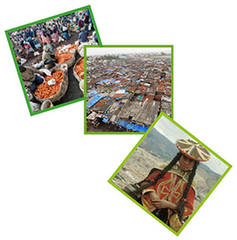At global level, the New Urban Agenda, for the first time in the history, recognizes food security and nutrition as an urban priority. The State of Food and Agriculture 2017 also highlights urbanization and the enormous potential of the food systems to drive sustainable development in both urban and rural areas. Since 2015, 148 mayors signed the Milan Urban Food Policy Pact committing to developing sustainable, inclusive and resilient food systems.
What the project does

The NADHALI project supports local governments on food systems planning as a key component for achieving sustainable development in urban areas. The project aims to create a common understanding and a strong foundation for developing food system strategies and mobilizing resources for developing implementation plans.
The project is currently being developed in three pilot cities: Nairobi, Dhaka and Lima and aims at developing food system planning as a crucial entry point for “making cities and human settlements inclusive, safe, resilient and sustainable” and “ending hunger and achieving food security and nutrition” as stipulated respectively by the SDG-Goals [11] and [2].
The local governments are recognized as key players on food systems planning and developing their capacity is considered key for achieving food security and nutrition in urban areas.
In January 2018 FAO started supporting the Municipality of Douala (Cameroon) on localizing the “NADHALI approach” to the Doula context, learning from the experiences of the pilot project.
Focus on three main actions
The key activities that define the “NADHALI approach” are the following:
- To establish a multi-stakeholder food systems platform at local level that acts as Food Liaison Advisory Group (FLAG) for informing municipal decision making on food related issues ensuring through a participatory process that different food-community interests are not set aside in the policy making process.
- To develop and pilot-test a Rapid Urban Food Systems Appraisal Tool (RUFSAT) aimed at identifying hotspots in the food systems that compromised or constrained the performance of the food systems in economic, social and environmental terms and creating holistic evidence on food systems for prioritizing interventions.
- To develop capacity on food systems planning at different levels and support the development of a Food Systems Strategy
In Lima and Nairobi the development of food systems strategy is already underway. In Lima, an ordinance is under discussion to formally recognize the FLAG, while the entire FLAG is going to sign the Carta Alimentaria (Food Charter) which includes the vision and priority for the cities.
Connected work
The NADHALI-project has acted as a driver attracting seed funds and creating synergies with ongoing work at FAO and other UN Agencies, private sector and academic institutions.
In Kenya, the following initiatives have been undertaken to complement the NADHALI project:
- A logistic system analysis on urban-rural food linkages, between small producers within and outside Nairobi county and the city markets (study co-implemented with UN-Habitat and Kuehne Foundation in Nairobi);
- Two studies, undertaken by Kenya University on Food Systems Policy and mapping of the food systems actors
- FAO study to map food flows and actors' behavior across supply chains.


